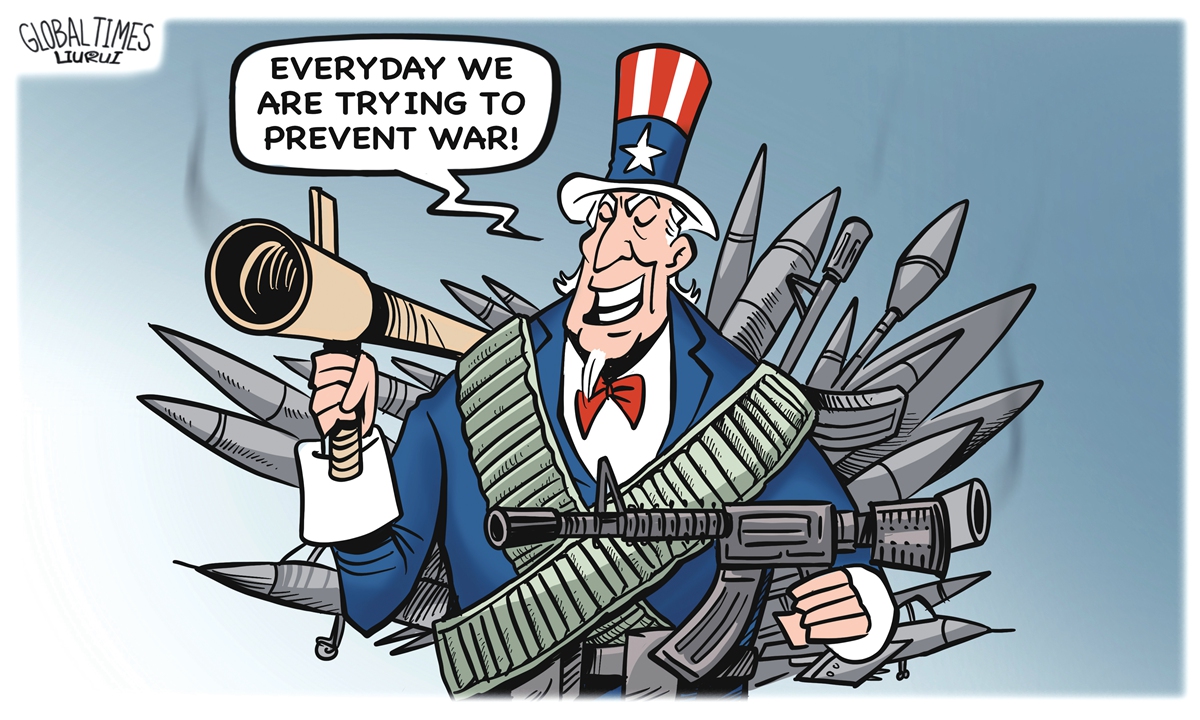
US hypocrisy Illustration: Liu Rui/GT
To be, or not to be - that is the question. Using this famous line from Shakespeare's Hamlet to describe the mentality of some people in Washington toward China could not be more appropriate.
Whether to wage war or remain at peace with China is a question that, although most agree on the answer, seems to make Americans more and more anxious.
On Thursday, Raja Krishnamoorthi, the top Democrat on the House select committee on China, said at a hearing that one of the questions often raised by his constituents is how the US can avoid an open conflict with China: "The majority of Americans see China as a competitor but they are concerned about this competition turning into a war." He quoted a survey from late 2021 which stated 71 percent of Americans were worried about a potential war with China in the next five years.
Why do Americans have such fears?
It is easy to answer if one looks at the successive policies Washington has introduced toward China. At this hearing, there were also clamors for full sanctions against Chinese tech giant Huawei and enlarged control measures to other Chinese companies.
A few days ago, on Capitol Hill, some lawmakers proposed legislation for the Democratic Republic of Congo in faraway Africa because China "controls" the country's mineral resources. Similar bills are coming one after another. More than 1,300 Chinese companies have been sanctioned by the US under various pretexts.
In China's neighborhood, US troops are intensively mobilized. The various alliances that Washington is putting together, which are said to be for the sake of security balance, all have an unspoken target, China.
Even the New York Times senses the smell of war. The title of the article published in the online edition on July 13 wrote, "'An Act of War': Inside America's Silicon Blockade Against China."
Former US president Ronald Reagan famously said, "Peace is not the absence of conflict, but the ability to cope with conflict by peaceful means." Just change one word and it will fit today's circumstance: Peace is not the absence of competition, but the ability to cope with competition by peaceful means.
On the surface, the Biden administration has recognized that confrontation with China is neither in the interests of China and the US nor the world at large.
On Friday, White House National Security Advisor Jake Sullivan said there was a "genuine possibility" for stable US-China relations, despite inherent competition and continuing tension between the two powers.
Nevertheless, Washington has adopted a zero-sum game of containment and aims to "defeat China." In fact, it is constantly squeezing space for peaceful management and depleting its ability to handle competition by peaceful means.
The contradiction between what the White House says and what it does is a typical response of psychological anxiety.
Dr. Henry Kissinger, who has recently visited China, warned in 2020 of the danger of a China-US conflict that could lead to war, saying that "unless there is some basis for some cooperative action [between China and the US], the world will slide into a catastrophe comparable to World War I."
The warning also underscores the concept of self-fulfilling prophecies, where expectations or beliefs about a situation can influence behavior that ultimately confirms those expectations.
In Washington, there is a strong belief that China is planning to replace the US as the dominant global power and that the latter must clamp down on the former in a much tougher way. And China is unlikely to keep holding back on this. A growing number of Chinese believe that the US aims to do everything in its power to hinder China's development.
History tells us that the anxiety of hegemonic power is always related to its unease toward challengers, and the perpetual fear could eventually lead to wars against challengers. Our concern is that the Biden administration faces an increasingly complex situation in adjusting its China policy, constraining it from taking a more sustainable and flexible approach to managing competition with China. Can Washington manage its out-of-control China policy, or not - that is the question.




